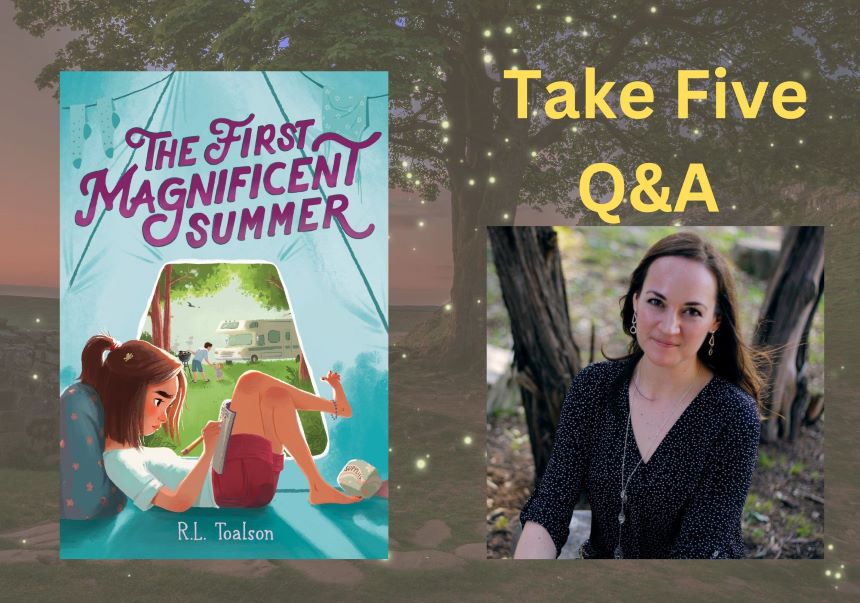Take Five: Rachel Toalson and THE FIRST MAGNIFICENT SUMMER
By Writer Unboxed | June 11, 2023 |
 We are so pleased to showcase an interview with WU contributor and award-winning MG, PB, and YA author and poet, Rachel Toalson, taking a closer look at her latest release, The First Magnificent Summer. There’s already plenty of buzz for the book, including this:
We are so pleased to showcase an interview with WU contributor and award-winning MG, PB, and YA author and poet, Rachel Toalson, taking a closer look at her latest release, The First Magnificent Summer. There’s already plenty of buzz for the book, including this:
“Toalson’s healing love song to those who are growing up (or grew up) with imperfect parents, reminding us that their imperfection isn’t your imperfection; that you’re perfect just the way you are.”—Kathleen March, Anderson’s Bookshop (Downer’s Grove, IL)
And this:
“Toalson handles difficult, complex subjects with nuance and care, never losing sight of who her readers are, and striking the delicate balance between honesty and hope.”–Jordan Leigh Zwick, The Book Seller (Grass Valley, CA)
Interested in a closer look? Let’s hear what Rachel has to say.
Q1: What’s the premise of your new book?
RT: The First Magnificent Summer is about a twelve-year-old girl who is all set for her first magnificent summer visiting her dad after her parents’ divorce and two years of not seeing him. She’s ready to impress him with her wit, her maturity, and her smarts. But things begin to fall apart on the long road trip from Texas to Ohio, as she shares a car and a summer with his new family, The Replacements; she deals with her father’s constant criticism and sexist treatment; and she gets her first period one thousand miles away from her mom and safety and all the comforts of home.
Q2: What would you like people to know about the story itself?
RT: Anyone who has ever been a young person knows the weight of other people’s expectations–a parent expecting them to not be so emotional or a teacher expecting them to stop writing in their journal so much and listen to instructions more or a grandparent expecting them to act like a lady (whatever that means). These were some of the heavy expectations I carried as a kid. We can easily lose sight of who we are by trying to please other people. The First Magnificent Summer is a book about becoming your magnificent self, despite who and what others expect you to be. And I hope everyone who reads this book closes it with an unshakeable conviction that they are magnificent just the way they are.
Q3: What do your characters have to overcome in this story? What challenge do you set before them?
RT: Victoria, the main character of the book, is one thousand miles away from her mother when she starts her first period. She doesn’t have enough period supplies and tries to handle it all on her own, because she doesn’t want to talk to her dad’s new wife (who’s part of the group she calls “The Replacements”) about something so personal. She tries to ration her period supplies, but of course that doesn’t work, and it creates a visceral panic in her (she also struggles with anxiety). She not only has to overcome this very real physical challenge, but she’s also faced with the realization (it actually sort of slaps her in the face) that Womanhood comes with a giant challenge: inequality. She notices that her father treats her brother differently than he treats her, and she suspects it’s because she’s a girl.
I think there’s a moment in every young girl’s life when she realizes that there’s an unfairness to her world, when compared to a boy’s world–whether she notices the inequality of funding for girls’ and boys’ school sports or how boys are statistically called on for answers more often in classes because implicit biases say they’re smarter. Or maybe she notices it in family relationships and expectations. Victoria confronts that moment in this story, and I think that’s one of the reasons the book connects so deeply with readers; they’ve been there, and they know.
Q4: What unique challenges did this book pose for you, if any?
RT: This book was terribly difficult to write. I’m a relatively fast writer; I write multiple books a year. But this one took me several years, from start to finish. Everything was there; it’s a very personal story, and I share some of the same experiences Victoria has in the book. But I couldn’t get the structure right. It started out as prose, and then I turned it into a novel in verse, and then I turned it back to prose. Back to poetry, back to prose, and finally I decided on journal entries with poetry and short essay asides, which felt right for the story and character. It took me several more drafts to layer in humor and make sure it had some levity even though it’s a serious book about real, difficult issues. My character is a sarcastic, funny, self-aware twelve-year-old–much like I was at that age. I think I wrote this one for twelve-year-old Rachel, and that’s why it took so long to finish. I wanted to honor her brilliance and value at a time she felt anything but brilliant and valuable. I wanted to get every word exactly right. I wanted to tell her (and the readers like her) that they are magnificent, despite their circumstances or the people in their lives who make them feel otherwise. I know I keep coming back to that. But it’s what twelve-year-old Rachel needed to hear all those years ago…and sometimes still does!
Q5: What has been the most rewarding aspect of having written this book?
RT: Seeing the way it connects with its readers has been the most rewarding aspect of having written this book. Young readers in this nine-to-twelve-year-old age group (which is the group at which the book is targeted) are looking for validation in their lives. They’re trying to figure out who they are and want to be. They’re searching for stories that show them no matter what they do wrong or how much they struggle or what they think or feel or believe or do, they’re still worthy of love. That they still matter to the world. Of course writers want to sell hundreds of thousands of books and get on bestseller lists and win awards, but, gosh, if I can help one kid who reads my book feel like they’re perfect just the way they are, that they don’t have to do anything or be anyone different to deserve love, then all those hours of writing and agonizing over structure and humor and is this the right poem to put here are completely worth it.
Thank you, Rachel! You can learn more about THE FIRST MAGNIFICENT SUMMER at Rachel’s website. Or connect with her on YouTube, Facebook, Twitter, and Instagram.










This sounds like the kind of book I could’ve used when I was 12 (my parents also divorced and there was a step-mother who was NOT MY MOTHER!). I might buy it anyway even though I’m a long way from 12 :)
I’ve noticed for a long time that if I click on the check mark to show I like the article, it actually deducts a point. Did it just now, too. Went from six to five. So I’ll put my check here. ✓
I’ve been wondering about those check marks myself. Sometimes they add, sometimes they subtract… I hope this gets fixed some time.